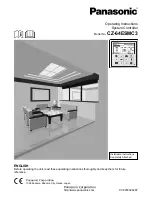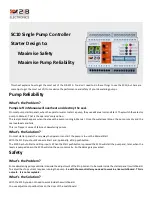
- 3 -
- 4 -
Terminal Figure
-
Front face terminal block
LOADER
PUM-C
BUS
TX/RX
PWR
Ethernet
LINK
Ethernet
RJ-45 connector
-
Base part (power terminal)
DC 24V (-)
Power terminal
DC 24V (+)
Note 1: Power cables more than one should not be connected between power terminals.
Note 2: Do not use terminals 3, 4, and 5.
Specification
General Specification
Power Supply
: 24V DC ±10%
Power Consumption
: Maximum 3.2W (135mA) [when 24Vdc is applied]
Dimensions
: 30(W)×100(H)×85(D) mm (excluding projection and terminal cover)
Weight
: Approx. 110g
Installation Method
: DIN rail mounting inside a cabinet / wall mounting with M3 screws
Ambient Temperature*
: -10 to 50 degrees C
Note: "Ambient temperature" means the temperature underneath the
equipment installed inside a dvice or a cabinet.
Ambient Humidity:
: 90%RH or less (no condensing)
Storage temperature/humidity: -20 to 60°C, 90%RH
Memory Backup:
: Backup by nonvolatile memory (EEPROM)
The number of rewriting: 100,000 times
Communication Functions
Communication specifications
: Ethernet 10BASE-T/100BASE-TX compliance
The number of port
: 1 port
Recommended hub
:
Industrial hub
Communication protocol
: IEEE802.3/IEEE802.3u compliance
Communication speed
: 10/100Mbps Auto-negotiation
Communication distance
:100m (between a hub and the device)
Recommended cable: Ethernet cable : Catgory 5e
Crimp terminal size
Please prepare cables and crimp terminals of the size indicated below.
Cable type
Size
Power supply, output, others
0.25 to 1.25mm
2
(AWG 22 to 16)
Crimp terminal
Cable size
Screw tightening torque
0.25 to 1.25mm
2
(AWG 22 to 16)
0.8 N•m
φ
3.2mm
6.0mm or less
Round-shaped solderless terminal Y-shaped solderless terminal
3.2mm
6.0mm or less
* Material thickness
0.9mm or less.
Model code
Enhanced communication module (Ethernet communication)
1 2 3 4 5 6 7 8
9 10
P U
1
−
0 C
Contents
M
Y Y
C
Module type
Enhanced communication module
Communication functions
E
Ethernet communication
Model code (Optional)
1 2 3 4 5 6 7 8
P U M Z *
Contents
A 0 2
DIN rail mounting endplate
A 0 3
Side connector termination cover (right & left 1 set)
L 0 1
Loader connecting cable (RS232C)
Mounting
-
Dimensions
30
100
50
1.5
5
6
When mounted/dismounted
to/from the DIN rail
(8
)
85
DIN rail
Main unit (When detached
from the base part)
(
30
)
Hole for screw
Locking tab
Terminal screw
M3
Hole for screw
base part
(When detached from the main unit )
LOADER
PUM-C
BUS
TX/RX
PWR
Ethernet
LINK
-
Cautions when mounting
Make sure to leave a minimum space of 30 mm (50mm is recommended) both above
and below the equipment.
30 or more
30 or more
-
Mounting to DIN rails
1. Pull down the locking tab of the base part.
Hook the back part of the unit onto the upper
part of the DIN rails.
2. Push the unit towards the direction of the ar-
row 2.
3. Pull up the locking tab of the base part to
fasten the equipment onto the DIN rails.
-
When connecting the equipment after
mounting it to the DIN rail, do not pull the
locking tab up at this point yet.
Lock lever
Main unit
Projection
How to detach the base part
1. Press the lock lever on the top of the
equipment.
2. Pull forward the upper part of main
unit.
3. Detach the cutout on the lower end
of the back of the main unit from the
projection on the base part.
-
To attach the main unit to the base
part, reverse the above procedure.
-
Make sure the lock lever on the main
unit is fitted into the base part after
attaching.
Gate City Ohsaki, East Tower, 11-2, Osaki 1-chome,
Shinagawa-ku, Tokyo 141-0032, Japan
http://www.fujielectric.com
Phone: 81-3-5435-7280, 7281 Fax: 81-3-5435-7425
http://www.fujielectric.com/products/instruments/
International Sales Div
Sales Group
-
Attaching the endplates
If you want to fix the equipment onto the DIN rails more firmly, use endplates (optional)
and a pair of side connector termination covers (optional).
LOADER
PUM-E
PWR
COM
STATION
4
3
2
1
0
F E D C B A
9
8
76
5
Di1
Di2
Di3
Di4
Di5
Di6
Di7
Di8
Do1
Do2
Do3
Do4
Do5
Do6
Do7
Do8
LOADER
PUM-E
PWR
COM
STATION
4
3
2
1
0
F E D C B A
9
8
76
5
Di1
Di2
Di3
Di4
Di5
Di6
Di7
Di8
Do1
Do2
Do3
Do4
Do5
Do6
Do7
Do8
LOADER
PUM-E
PWR
COM
STATION
4
3
2
1
0
F E D C B A
9
8
76
5
Di1
Di2
Di3
Di4
Di5
Di6
Di7
Di8
Do1
Do2
Do3
Do4
Do5
Do6
Do7
Do8
LOADER
PUM-A
PWR
COM
OUT1
OUT2
OUT3
OUT4
STATION
4
3
2
1
0
F E D C B A
9
8
76
5
LOADER
PUM-C
BUS
TX/RX
PWR
Ethernet
LINK
Side connector termination covers
(right & left 1 set)
DIN rail mounting
endplate
DIN rail mounting
endplate
-
Fixing with screws
When fixing the equipment on the wall using screws, connect module base parts first.
*Fixing screws are to be prepared by customers.
1. Decide the mounting position, referring to the figure below for the mounting screw
hole.
(30)
9
0.2
±
88.5
0.
2
(100)
(3)
30
+0.7
+0.2
2-M3
Unit [mm]
2. Remove the main unit from the base part.
- See [How to detach the base part]
3. Connect the base part, and then pull all the locking tabs up to fasten.
4. Fix the base part onto the mounting position on the wall with screws.
5. Attach the module main unit to the base part.
-
Connecting modules
1. Check the locking tab is pulled down.
2. Connect modules by connecting the side connectors with each other.
LOADER
PUM-A
PWR
COM
OUT1
OUT2
OUT3
OUT4
STATION
4
3
2
1
0
F E D C B A
9
8
76
5
LOADER
PUM-C
BUS
TX/RX
PWR
Ethernet
LINK
Locking tab
Side
connector
Hook
DIN rail
Locking tab
3. After mounting modules to the DIN rails, push up all the locking tabs.
Modules are fastened to the DIN rails and to each other at the same time.
4. The power supplies are connected each other inside connected modules.
LOADER
PUM-A
PWR
COM
OUT1
OUT2
OUT3
OUT4
STATION
4
3
2
1
0
F E D C B A
9
8
76
5
LOADER
PUM-A
PWR
COM
OUT1
OUT2
OUT3
OUT4
STATION
4
3
2
1
0
F E D C B A
9
8
76
5
LOADER
PUM-C
BUS
TX/RX
PWR
Ethernet
LINK
Setting
-
Communication behavior setting
Set communication behavior by DIP switches on the back of the module (SW1 to SW6).
1 2 3 4 5 6
ON
Communication
behavior setting
Communication behavior
SW No.
1
2
(Note 1)
3
(Note 1)
4
5
6
Modbus/TCP bridge communication
Note 2
OFF
OFF
OFF
Modbus/TCP mapping communication
OFF
ON
Micrex-SX programless communciation
ON
OFF
Note 1: You cannot set both SW2 and SW3 to ON simultaneously.
Note 2: When you set SW1 to ON, the Ethernet communication setting will be restored to factory default.






















